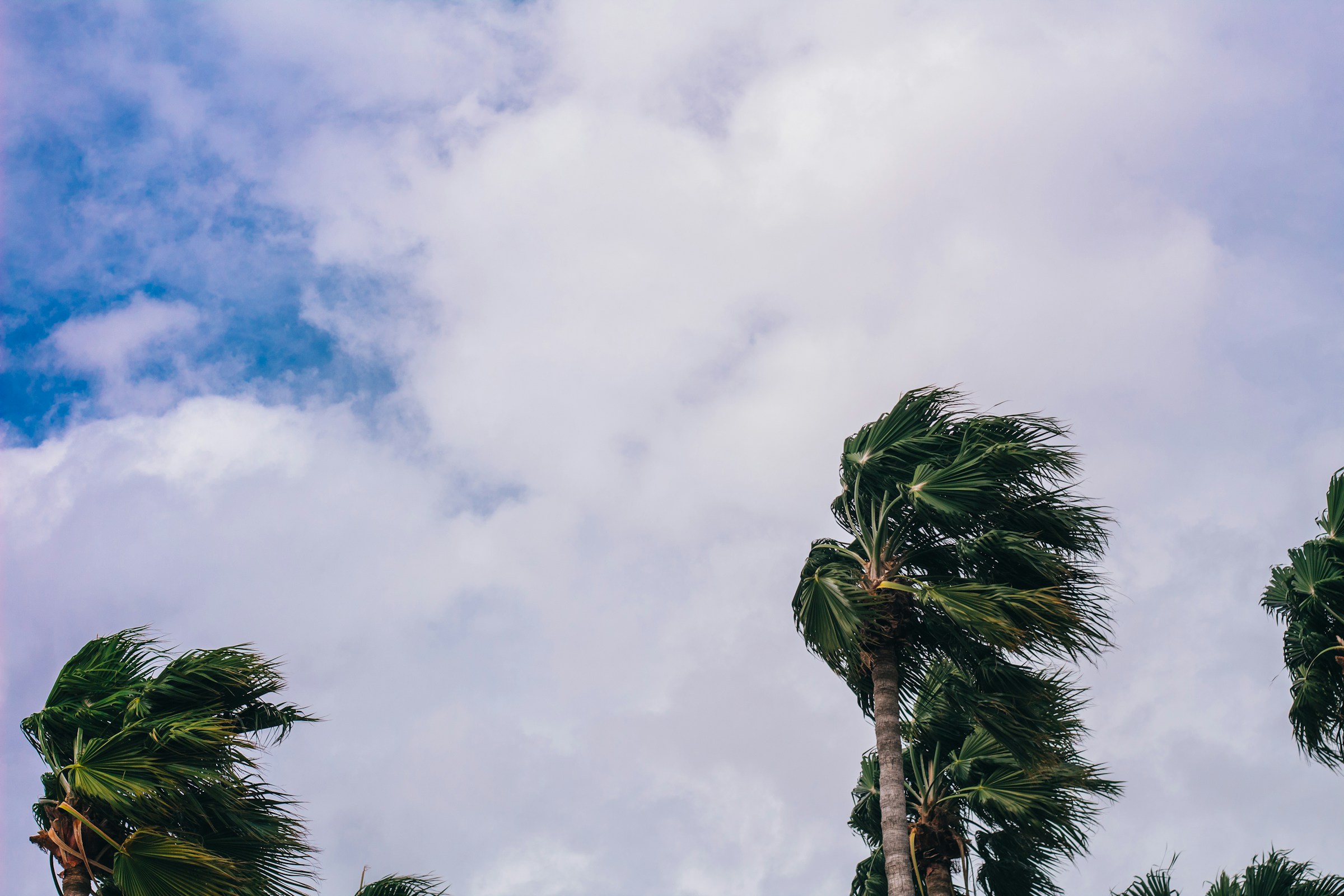
By Keith Woods
On Friday, September 26, 2025, the UW Center for Journalism Ethics hosted its 16th annual conference “Journalism Ethics in a Fracturing World.” Keith Woods, recently retired as the chief diversity office of NPR, delivered the following keynote address.
A year ago today, my wife and I watched from a smelly, pet-friendly hotel in central Florida as Hurricane Helene churned to the west of Tampa, pushing the waters of the Gulf of Mexico into Tampa Bay, which swelled the belly of Hillsborough Bay, which forced its way into the Davis Islands canals, which overtopped the seawalls and poured into our home, ending, in one destructive night, our 26 years at that address.
So September 26th instantly became one of those solemn benchmarks that bracket chunks of our lives and bring us inexorably to these anniversaries of remembrance and reflection.
It has been a trying, costly, post-disaster year of loss, displacement and relentless change that at times has shaken our family to its roots. And because Helene is now a lens through which I view all things, you might forgive me for finding in today’s topic – “In Defense of Journalism” – an ironic if imperfect metaphor.
I’m aware that that framing does not make for optimism or inspiration, which ought to be the point of a full-throated defense of our profession, but I promise you I’ll try to get there. It’s just that I can’t honestly start there. In fact, to be completely candid, I had to find my way through a crisis of faith – more accurately a crisis of proportion – just to get to the blank page that preceded these words.
Here is the parallel to Helene.
In days and months since Helene, I have wondered these two things:
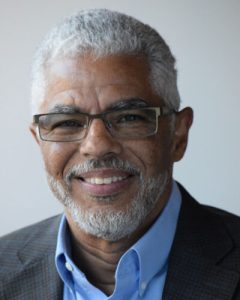
How do I complain about ruined furniture, books, pictures; memorabilia; even the loss of the home where we raised our children; when more than two hundred fifty people lost their lives in Helene and a mountainside slid down on the heart of Western North Carolina?
And how do I worry about the troubles of one profession, love it as I might, when the country itself seems to be sliding unchecked into autocracy?
In both cases, it feels like there’s always something more important to talk about; a bigger threat; a greater loss; ever a cause more deserving. If you’ll hang with me, I’ll work through the ethical dissonance and get around to the task at hand. Because even as I struggle with these relative challenges, what is undeniable is that while journalism is precious in its own right and deserves the time and attention we’re giving it today, it is also a critical breaker that stands between democracy and the forces that would destroy it.
Our profession meets this moment in a weakened state. The American Journalism Project reports that no fewer than 3,300 newspapers have vanished since we entered the 2000s, leaving some 1,800 news deserts across the country. Layoffs on every media platform have claimed more than 10,000 jobs in the past five years alone. You know things are bad when the Neiman Reports magazine publishes a step-by-step guide to help journalists brace for layoffs, including advising them to back up their portfolios of work in the cloud in case their employer and their archives suddenly cease to exist.
Meanwhile, journalists chase dwindling audiences beset with fatigue from relentless waves of soul-crushing news – also known in the industry as any day of the week. Americans face a paralyzing array of choices and infinite distractions – streaming, broadcasting, on-demand; digital and downloadable content that’s feeding an insatiable appetite for … everything, and nothing in particular. Most Americans, according to the Reuters Institute for the Study of Journalism, access the news through social media today, where the competition for their attention might be a viral Tiktok trend of people peeing in public.
Let me help shake that image from your brain by taking you back to this date last year.
People who compare disasters like to say that it’s better to deal with hurricanes than tornadoes or earthquakes or wildfires because hurricanes take days, even weeks to arrive, while the others can happen in an instant. You can track the storm, they say, and you have time to prepare. But not really. In reality, you wait and wait and wait, hoping you won’t have to upend your life; rearrange things; prepare for something that might not happen. You get complacent, even where I live – on the hurricane superhighway.
Denise and I had worried about flooding in 2023 when Hurricane Idalia passed to our west, and we moved furniture up to higher places and packed up photo albums and precious books and important papers and her paintings and endured evacuation traffic to sit with friends in Georgia and wait for the worst. Which didn’t come. Again. The canal behind our house rose higher than we’d seen it in 25 years, but it didn’t get in the house. Same as the last time. Which is my way of explaining why, as Helene moved up the Gulf of Mexico on this day last year, we just rolled up a couple of rugs, put some towels around the doors and drove to a hotel 25 minutes away to wait for the all-clear.
I find that when a hurricane is coming your way, your news consumption shrinks to the most trusted sources and the most basic information. What is the latest storm track? Where can I get sandbags? You tune to local news, check digital sites to see who has gas or water or plywood. You listen to your NPR station. You take guidance and comfort from familiar voices and trustworthy newsrooms, people and places you otherwise take for granted, because they’re always there, and they’ll always be there.
Here would be a good time to mention that in four days, the Corporation for Public Broadcasting, with no budget, no staff and no Congressional appropriation to disburse to the nation’s public radio and television stations, will close its doors. Some stations will go dark.
That’s a jolting sentence to write, even in this year of jolting sentences. But maybe we could’ve seen that storm coming. When a sitting president declares that journalists are the enemy of the people – that was a lifetime of jolting sentences ago – the shutdown of CPB becomes to public radio journalism as a hurricane’s landfall is to the Gulf Coast. Inevitable. Lamentable. Devastating.
***
As we stand here today in defense of journalism, we need to take the full measure of the forces we are defending against. Go back in time from this day and watch the fierce swirl of government overreach, censorship, and retaliation take form. See how malevolent winds blew away the veneer of editorial integrity in some news organizations and contorted the flaccid backbones of networks and corporations such that they are in a permanent pose of subservience.
It has been a long year. Just last week, as you surely know, the Department of Defense announced it would require that journalists wishing to get Pentagon press credentials pledge that they will not report any information unless it is explicitly authorized by the department. Report a leak, cite an anonymous source or publish something like, say, the Pentagon Papers, and there goes your access.
Just a month ago, the administration laid off nearly half of the employees at the parent agency of Voice of America, whose newly appointed leader complained that VOA’s journalists were being unfair to the president. A network that once broadcast in nearly 50 languages is down now to four.
Go back one month more to July, when the political majority in Congress voted to claw back more than a billion dollars in federal support for public radio and public television. That money had already been approved by Congress through a funding structure meant to prevent precisely the kind of partisan action that now threatens the existence of some local newsrooms. That vote made good on the threat issued in last spring’s lopsided Congressional hearing, at the end of which the committee chair said that public media leaders could now “hate us on their own dime.”
I wish that was the end of this litany, but there’s more.
In April, a federal judge reversed a decision by the president, who had kicked the Associated Press out of the White House because the wire service wouldn’t cede editorial independence and call the Gulf of Mexico by the new name the president insists we use. In a related move, the administration took over the process of deciding who could be in the press pool rotation, surprising no one by adding friendlier organizations, podcasters and bloggers.
We’re back to February now, when The Atlantic’s Editor in Chief Jeffrey Goldberg was inexplicably added to a group chat on the messaging app Signal, a chat in which the leaders of the Department of Defense laid out their plans to launch airstrikes against Houthi sites in Yemen. There were denials that this security breach was, in fact, a security breach. Then the evidence surfaced and there were Mea Culpas, followed by insults.
Sleazebag. That’s what the president called Goldberg.
That’s the strategic, credibility-wrecking drumbeat playing in the background through all of this. You’ve heard it.
Denigrate. Discredit. Defund.
Da dum. Da dum. Da dum.
It hurts to hear it, this relentless dissing of our profession. But when you’re neck-deep in a crisis of proportion, it feels like sticks and stones when there are bigger things happening; things that redefine democracy; things that demand the spotlight; matters captured in other single-word descriptors.
DOGE. Deregulate. DEI.
Da dum. Da dum. Da dum.
***
As Hurricane Helene passed us last September, our home took in nearly three feet of water; a septic soup of saltwater, sewage and the saturated possessions soon to be heaped onto the curb outside. When we were allowed back into the neighborhood, we went heads-down with our children on a mission to save pictures and Mother’s Day cards and old scrapbooks and yearbooks and plain old books. We worked day and night to sort the ruined things from the salvageable things, to phone FEMA and find someone to help head off mold and the second wave of destruction it could bring.
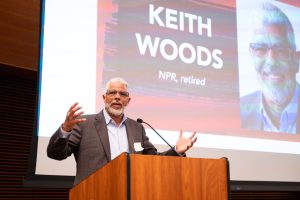
We were oblivious for days to anything happening beyond our block. But even there, we knew people who had it worse than us. Ours was a two-story house, so some furniture survived unscathed. Our neighbors on one side lived in a small ranch house, and practically everything they owned was under water. And even as I tried to grasp the scope of what had happened to Tampa, I kept seeing references in my email to Asheville.
What was happening there?
I might have dug deeper then, but Hurricane Milton had spun up in the Western Caribbean and early forecasts suggested a Category 5 storm would push a wall of water 12 feet or higher into our city.
We watched, read, listened to the local news; packed what possessions we had left into self-storage units and into our cars, and we headed again for Georgia. As Milton devastated counties to the south of us and rearranged our lives yet again, I finally was able to see the pictures and hear the sounds of greater loss coming out of Asheville.
That was in October of last year, a few days before the billionaire owners of the Los Angeles Times and the Washington Post opted not to endorse anyone for president, just as each newspaper’s editorial team was about to back the Democratic candidate.
A season of media capitulation was upon us. I switched my language up a little just now, because I was asked to come here today to speak in defense of journalism, not media, and here, the distinction matters. In this era of mega mergers and acquisitions and owners growing ever more distant from the journalists they employ, not everyone sees the difference between a corporation like, say, Disney, and a network like, say, ABC, and a news show, say “This Week with George Stephanopoulos.”
But it’s important to point out that it wasn’t ABC’s journalists who decided to give $15 million dollars to the president for his library rather than fight a lawsuit over using the wrong word to describe a court’s ruling that, decades ago, he sexually assaulted a columnist. It wasn’t the journalists at “60 Minutes” who were trying to secure FCC approval of a big corporate merger between Paramount and Skydance Media and decided to drop another $16 million into the presidential library fund rather than fight a flimsy lawsuit over the way the staff edited an interview with the former vice-president.
And it wasn’t journalists contracted by Meta who decided to sacrifice truth, accuracy and fairness by ending the practice of fact-checking at the massive media company. Meta justified its decision by claiming that it was the fact-checkers themselves, not so much its disinformation-spewing users on Facebook, who were guilty of political bias and censorship.
This flip-the-blame strategy has been golden for those who would rain corruption and malfeasance and extortion and authoritarianism down on us and then cast journalism as the villainous fount of nasty news. But nowhere has that strategy worked better than in the demonization of Diversity, Equity and Inclusion. DEI. The new N-Word. The American obscenity.
Here, I have a harder time standing in defense of a profession I called home for nearly 50 years.
You could get whiplash from watching our industry’s pendulum swing back from the era just a few years ago of so-called racial reckoning. Those were the heady days of long-overdue apologies; acknowledgments that coverage was distorted; and the countless published pledges that said we are really, really, totally committed this time to fixing this problem that we created.
New job titles popped up all over the place. Diversity committees appeared out of nowhere. Coverage of race and identity rose on the journalism agenda to heights not seen since the 1960s.
Then the backlash began, and as rollbacks and rebranding and legal assaults on DEI gathered strength, journalism covered it piecemeal, connecting few dots, reporting as though these were individual thunderstorms and not a systemic typhoon taking form.
We in journalism could see the storm, but figured it wasn’t headed for us. Higher education took a direct hit from the orchestrated, state-by-state passage of anti-DEI laws and legislative maneuvering of the sort that all but ended diversity at this university. Caught in the resulting rip tide were university-licensed public radio stations and the journalists they employed. But this wasn’t journalism’s storm. It slammed into law firms and big-box stores and Tractor Supply on a track that would see Hurricane Executive Order make landfall on January 20th right at the doorstep of the sprawling federal bureaucracy.
Here would be a good time to mention to you that the eye of Hurricane Helene never hit Tampa. It passed by us from about 130 miles away. But it was such a massive, indiscriminate, bully of a storm that being merely adjacent to us was close enough, such was the destruction.
Journalism, in this metaphorical telling, could have defended itself then. It could have defied the ill winds and protected the precious values in DEI work and taken whatever hits were coming. But so many leaders, in so many places, chose capitulation. The results have been catastrophic:
No more pushing back against the just-like-me habits in hiring that created the gender and racial imbalances that persist in many newsrooms today.
No more counting sources to be sure we’re not losing the battle against personal and societal biases, perpetuating in our reporting the lie that expertise is a male thing and a white thing and an elite college thing.
No more training journalists to tell authentic stories across difference, stories that help long-ignored or misrepresented audiences recognize themselves in our coverage so that they might stand behind us in times like these. Where, today, do we even have that conversation?
I don’t lament the disappearance of DEI statements and pledges from journalism’s websites, because it takes more than a few words over a couple of years to earn my trust. If you just joined this conversation in 2020, you might think it was a new thing, this retreat. Read your history.
Like floodwaters will exploit every weakness in your home’s defenses, empowered bigotry will figure out quickly who has a spine when it comes to DEI, and who just talks about it.
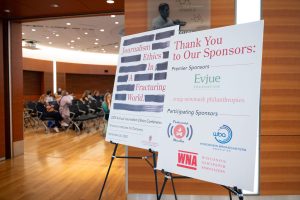 It’s impossible for me to leave this subject without remembering my friend and former boss John Lansing, who stood tall for journalism for decades until his big heart stopped beating a year ago. I wish you could have been there the first time John stood in front of NPR’s newsroom leaders, and someone asked if Voice of America, whose parent company John had recently led – whose voice the president has all but silenced – was just an instrument of U.S. propaganda. John told them stories of journalists risking and losing their lives to tell unpopular truths in countries far more experienced than ours at vindictive authoritarianism. He dared the editors to walk in the shoes of those journalists. The humbled silence in the room was profound. I wish you could have heard him stand up for diversity from his very first day at NPR until his very last one, in a way few of journalism’s CEOs have ever done. I wish you could have heard him say, over and over until you understood that it was more than a slogan, that the work of diversity was the work of journalism, and the work of journalism in this democracy was never more important than it is today.
It’s impossible for me to leave this subject without remembering my friend and former boss John Lansing, who stood tall for journalism for decades until his big heart stopped beating a year ago. I wish you could have been there the first time John stood in front of NPR’s newsroom leaders, and someone asked if Voice of America, whose parent company John had recently led – whose voice the president has all but silenced – was just an instrument of U.S. propaganda. John told them stories of journalists risking and losing their lives to tell unpopular truths in countries far more experienced than ours at vindictive authoritarianism. He dared the editors to walk in the shoes of those journalists. The humbled silence in the room was profound. I wish you could have heard him stand up for diversity from his very first day at NPR until his very last one, in a way few of journalism’s CEOs have ever done. I wish you could have heard him say, over and over until you understood that it was more than a slogan, that the work of diversity was the work of journalism, and the work of journalism in this democracy was never more important than it is today.
So maybe there is no crisis of proportion. It matters equally that the president attempts to silence the New York Times with a $15 billion lawsuit as it does that Congressional cuts threaten the existence of a tiny public radio station in Western North Carolina.
Because for me, it was Blue Ridge Public Radio that brought home the story of what Hurricane Helene had done to Asheville. As my wife and I sat with friends in Georgia and discussed our post-disaster future, the reporters and staff of that small Asheville station, themselves left without electricity and running water, slept on air mattresses at the station, worked 12-hour shifts and longer, hauled creek water into the station to flush the toilets and stayed on the air to provide life-saving information to the stunned people of the Mountain Region.
In the days after the storm, news director Laura Lee said, people wrote to the station to tell how their listeners had “dug up an old radio and some batteries, or they had a hand-crank radio, and … we were their only source of any information for several days. That’s a responsibility,” the news director said, “that this team took really seriously.”
The enemies of independent journalism in Congress, who dressed up their opposition to funding for public radio and public television in the laughable guise of fiscal responsibility, cut as much as $330,000 from the budget of a station with an outsized role in their community and fewer than 10 full-time reporters.
So I stand here today not just in defense of their journalism, but of their right to exist. I stand here free of the comparative ethics that would place the urgency of protecting big newsrooms above the small or protecting democracy over defending a profession. I stand for the imperfect behemoths and the risk-taking start-ups, for the well-funded commercial outfits and the scrappy non-profits like Suncoast Searchlight. Because it is so clear today that our collective fates are inextricably bound to one another. Preserve journalism and we preserve democracy. Save democracy and journalism, like water, will find its proper level.
We live in perilous times. We live in a moment of superficial nationalism and patriotism tinged with ethnocentrism, misogyny, religious hatred, racism, transphobia and the ass-backwards idea that we define ourselves as a nation not by who we are, but by who we don’t want. We live in a time when our leaders are not standing against bigotry, but against the idea that bigotry even exists; standing not in support of inclusion, but in support of the right to exclude. We live in a moment where our leaders have distorted the rhetorical picture until it seems that all efforts we have undertaken to fix these undeniable problems are, themselves, the problem.
To rise in defense of journalism now is to rise to our own defense. Self-interest is not in competition with a greater good, it is on the path to the greater good. When the Associated Press was under attack by the administration earlier this year, executive editor Julie Pace said that “if we don’t step up to defend the right of Americans to speak freely, who will?”
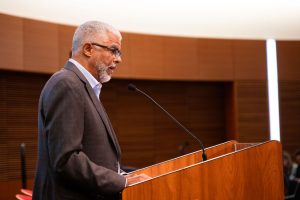 Still, on its best days, journalism merely shines a light, pulls back a curtain, reveals, exposes, explains and contextualizes. It is not itself accountability, but the means by which people and institutions might be held accountable. Defending it, supporting it – that will always be the work of journalism’s beneficiaries. Our work. Your work. I find this thought by John Thornton, who founded the Texas Tribune and co-founded the American Journalism Project, to capture perfectly that sense of public duty.
Still, on its best days, journalism merely shines a light, pulls back a curtain, reveals, exposes, explains and contextualizes. It is not itself accountability, but the means by which people and institutions might be held accountable. Defending it, supporting it – that will always be the work of journalism’s beneficiaries. Our work. Your work. I find this thought by John Thornton, who founded the Texas Tribune and co-founded the American Journalism Project, to capture perfectly that sense of public duty.
He said that “the maintenance of an informed public is the responsibility of the public itself, not the incidental byproduct of a series of commercial transactions.”
To stand in defense of journalism, then, is to subscribe; to donate; to render journalism relevant by consuming it; by becoming informed and, I would add, by acting on what you know.
***
When we’re done here today, I’ll start figuring out what that last part means for me. I’ll go back to our temporary digs in Tampa tonight and, in the morning, we’ll begin the frantic home stretch of packing our lives in boxes and bins while, by sheer coincidence, three tropical systems churn in the Atlantic Ocean. Like journalism, we know that when the storm has passed, you get up, rebuild, move on. And in a little more than a week, nearly one year since the day Denise and I last evacuated, we will move to Georgia and, for the first time ever, I’ll experience life off the hurricane superhighway.
I will keep my connections to journalism and find new grounding in a new home, and as I search for purpose, I’ll probably wrestle – in spite of myself – with the big crisis of proportion question, asking whether it is journalism or democracy that most needs my help.
And I will remember again that the answer will always be …
Yes.
Keith Woods is chairman of the board of Suncoast Searchlight, a non-profit investigative journalism startup based in Sarasota, Florida. He most recently retired as chief diversity officer of NPR, where, for the last 15 years, he led efforts to enhance diversity in the organization’s audience, content, and staffing while serving as a resource for NPR leadership, staff, and public radio leaders from more than 260 member stations nationwide.
Before joining NPR, Keith was dean of faculty at The Poynter Institute in St. Petersburg, Florida, where he taught for 15 years on topics including reporting, ethics, covering race relations and personal essay writing. He has trained journalists, educators and students at nearly every major new organization and journalism school in the country. He is a co-author of “The Authentic Voice: The Best Reporting on Race and Ethnicity” and has chaired two Pulitzer Prize juries.
A New Orleans native, Keith graduated from Dillard University and Tulane University’s School of Social Work. Before joining Poynter, he spent nearly 16 years at the New Orleans Times-Picayune as a sportswriter, news reporter, city editor, columnist and editorial writer.